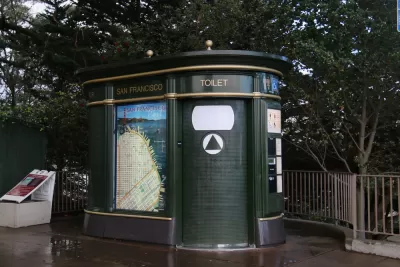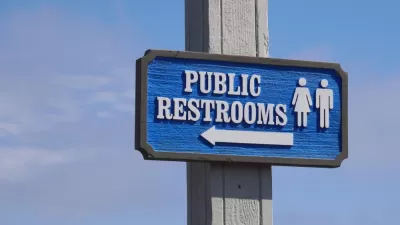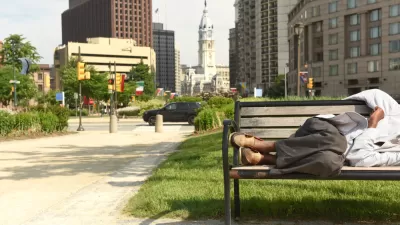San Francisco’s Pit Stop program, which provides public restroom facilities to vulnerable and unhoused residents, has helped contribute to a decline in feces-related service calls in the Tenderloin.

Adriana Rezel reports in a paywalled article for the San Francisco Chronicle: “Since 2012, San Francisco’s 311 hotline, which allows people to make requests of city service representatives, has received more than 230,000 complaints about human or animal waste in the streets. Over that period, the number of these calls has been steadily increasing in every San Francisco neighborhood, with one exception.”
That exception might surprise—it’s the Tenderloin, the neighborhood in the city most commonly associated with people experiencing homelessness and mental illness.
According to the Chronicle’s analysis, “the average neighborhood saw a nearly 400% increase in calls from 2012 to 2021, the Tenderloin actually saw a 29% decrease.” The city’s most recent Homeless Point-In-Time Count, released in August, estimated that 20,000 people will experience homelessness in the city this year—only a slight drop from 2019, and not commensurate in the decline in feces-related 311 calls in the Tenderloin. Moreover, 311 calls increased by 95 percent over the same period, according to Rezel.
So what reason could there be for the decline? “The most likely explanation is the introduction of the San Francisco Public Works department’s Pit Stop Program,” writes Rezel.
“Started in 2014, the Pit Stop Program is an initiative that offers free-to-use public toilets in select locations. With 33 locations now open in 13 neighborhoods across the city, Pit Stops are attended by paid staff during working hours and offer running water, soap and other services such as dog waste bags and boxes for needle disposal,” according to the article.
FULL STORY: Poop complaints have swelled in all San Francisco neighborhoods — except this one

Manufactured Crisis: Losing the Nation’s Largest Source of Unsubsidized Affordable Housing
Manufactured housing communities have long been an affordable housing option for millions of people living in the U.S., but that affordability is disappearing rapidly. How did we get here?

Americans May Be Stuck — But Why?
Americans are moving a lot less than they once did, and that is a problem. While Yoni Applebaum, in his highly-publicized article Stuck, gets the reasons badly wrong, it's still important to ask: why are we moving so much less than before?

Using Old Oil and Gas Wells for Green Energy Storage
Penn State researchers have found that repurposing abandoned oil and gas wells for geothermal-assisted compressed-air energy storage can boost efficiency, reduce environmental risks, and support clean energy and job transitions.

Minneapolis Bans Rent-Setting Software
Four cities have enacted restrictions on algorithmic software that can inflate rent costs.

Oakland to Add 244 New EV Chargers
Oakland plans to launch its new charging network at eight locations by the end of 2025.

Jane Goodall Inspires with Message of Hope, Resilience, and Environmental Action
Speaking in Pasadena, Jane Goodall offered a hopeful and inspirational message, urging global compassion, environmental responsibility, and the power of individual action to shape a better future.
Urban Design for Planners 1: Software Tools
This six-course series explores essential urban design concepts using open source software and equips planners with the tools they need to participate fully in the urban design process.
Planning for Universal Design
Learn the tools for implementing Universal Design in planning regulations.
Heyer Gruel & Associates PA
City of Moreno Valley
Institute for Housing and Urban Development Studies (IHS)
City of Grandview
Harvard GSD Executive Education
Salt Lake City
NYU Wagner Graduate School of Public Service
City of Cambridge, Maryland





























